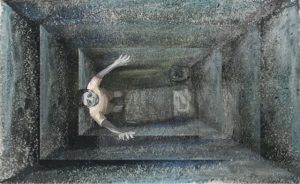 A couple blogs ago we spotlighted Rosie Day, a woman with special needs whose family extended both the length and quality of her life. One thing we should remember, though, is that ALL of us have special needs, and they can only be met as Rosie’s were: by connecting with the love of family. This Sunday’s mass readings remind us how important family lineage is throughout scripture. Take the case of Bartimaeus, the blind man in Mark’s gospel (Mk 10:46-52). He tries to get Jesus’ attention as the Master interacts with the crowds who’ve become a normal part of his ministry. But how? Just as the hemorrhagic woman (mentioned earlier in Mark’s gospel) grabbed Jesus’ attention away from the crowd pressing in on him with the slightest faith-filled touch of his cloak, Bartimaeus found a way to make his voice heard above the din of voices ringing in the Master’s ear:
A couple blogs ago we spotlighted Rosie Day, a woman with special needs whose family extended both the length and quality of her life. One thing we should remember, though, is that ALL of us have special needs, and they can only be met as Rosie’s were: by connecting with the love of family. This Sunday’s mass readings remind us how important family lineage is throughout scripture. Take the case of Bartimaeus, the blind man in Mark’s gospel (Mk 10:46-52). He tries to get Jesus’ attention as the Master interacts with the crowds who’ve become a normal part of his ministry. But how? Just as the hemorrhagic woman (mentioned earlier in Mark’s gospel) grabbed Jesus’ attention away from the crowd pressing in on him with the slightest faith-filled touch of his cloak, Bartimaeus found a way to make his voice heard above the din of voices ringing in the Master’s ear:
“Jesus, son of David, have pity on me.”
That must have been music to Jesus’ ears. Someone in this gathering understands his royal lineage and its role in humanity’s salvation!
Matthew started his gospel by teaching us his Master’s place in the family of Abraham. The line from Abraham to David to Jesus extends centuries, as he explains:
Thus the total number of generations from Abraham to David is fourteen generations; from David to the Babylonian exile, fourteen generations; from the Babylonian exile to the Messiah, fourteen generations.
This represents a stream of royal blood from which the faithful in the family of man have been nourished and their special needs met. Back to Bartimaeus and Mark’s gospel:
Jesus said to him, “What do you want me to do for you?” The blind man replied to him, “Master, I want to see.” Jesus told him, “Go your way; your faith has saved you.”
The first reading from Jeremiah (Jer 31:7-9) takes us back in Jesus’ lineage to Jacob and tells of a reuniting of the families of Israel (which would then lead to the second covenant, through which all the faithful families of man will be reunited and healed):
I will gather them from the ends of the world, with the blind and the lame in their midst, the mothers and those with child; they shall return as an immense throng. They departed in tears, but I will console them and guide them; I will lead them to brooks of water, on a level road, so that none shall stumble. For I am a father to Israel.”
And Father to the author of the second covenant! By drafting that agreement through Christ’s birth and sealing it in his blood, our Father welcomes all souls to the family reunion to which that covenant leads. The author of the Epistle to the Hebrews tells us in Sunday’s second reading (Heb 5:1-6) that Jesus is the priest and patriarch of this church family:
It was not Christ who glorified himself in becoming high priest, but rather the one who said to him: “You are my son: this day I have begotten you;” just as he says in another place: “You are a priest forever according to the order of Melchizedek.”
Much Biblical ink is devoted to humanity’s family lineage going all the way back to Adam. Adam’s fall into the devil’s self-sufficiency trap ensured that succeeding generations would struggle with special needs of all kinds. It wasn’t until the second Adam joined us in our struggle with those needs that we learned how special those needs are to helping us find the healing power of God’s love in each other’s arms.
–Tom Andel